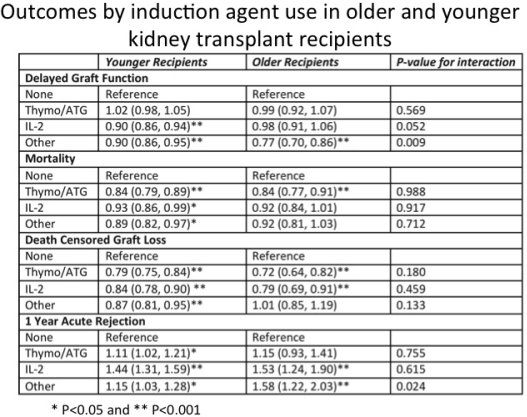Induction Agent Use and Outcomes in Older KT Recipients: Patient and Center Level Associations.
Johns Hopkins, Baltimore.
Meeting: 2016 American Transplant Congress
Abstract number: C48
Keywords: Age factors, Induction therapy, Kidney transplantation
Session Information
Session Name: Poster Session C: Clinical Science - Kidney Immunosuppression: Induction Therapy
Session Type: Poster Session
Date: Monday, June 13, 2016
Session Time: 6:00pm-7:00pm
 Presentation Time: 6:00pm-7:00pm
Presentation Time: 6:00pm-7:00pm
Location: Halls C&D
Background: Clinical trials of induction agents typically exclude older recipients, so our practice in older recipients is extrapolated from this. Older adults are different, so maybe that extrapolation is misled.
Methods: We used SRTR data to study 15,204 older deceased donor KT recipients (2005-2013). Induction agents were classified as ATG, IL-2, or other induction. The risk of DGF and 1-year acute rejection by induction agent use was estimated using modified Poisson regression adjusting for recipient and KT factors. Mortality and death-censored graft loss risk were estimated using an adjusted Cox Proportional Hazards model. We compared outcomes between older and younger KT recipients and used multi-level modeling to account for center characteristics (% of older KT recipients, center volume, % of older adults using an induction agent, year of induction agent introduction).
Results: Among older KT recipients, 81% received an induction agent. Compared to those who did not receive an induction agent, other induction agent use as associated with a decreased DGF risk. Similarly, the risk of mortality and death-censored graft loss for older recipients who received ATG were decreased compared to those who did not receive an induction agent. Older adults who received IL-2 were at a decreased risk of death-censored graft loss compared to those who did not receive an induction agent. The risk of rejection for older recipients was increased for those who received IL-2 induction agents, as well as other induction agents but not ATG. There was a greater decrease in the risk of delayed graft function by other induction agents for older recipients compared to younger recipients (P=0.009). Results were similar although slightly attenuated after accounting for center characteristics.

Conclusions: Among older KT recipients, ATG was associated with a decreased risk of mortality and death-censored graft loss; IL-2 was associated with a decreased death-censored graft loss. Outcomes associated with induction agent use in older adults may be due to immunosenescence associated with aging.
CITATION INFORMATION: McAdams-DeMarco M, Huang Q, Luo X, Orandi B, Dorry S. Induction Agent Use and Outcomes in Older KT Recipients: Patient and Center Level Associations. Am J Transplant. 2016;16 (suppl 3).
To cite this abstract in AMA style:
McAdams-DeMarco M, Huang Q, Luo X, Orandi B, Dorry S. Induction Agent Use and Outcomes in Older KT Recipients: Patient and Center Level Associations. [abstract]. Am J Transplant. 2016; 16 (suppl 3). https://atcmeetingabstracts.com/abstract/induction-agent-use-and-outcomes-in-older-kt-recipients-patient-and-center-level-associations/. Accessed July 1, 2025.« Back to 2016 American Transplant Congress
